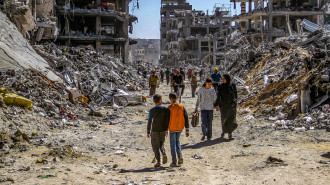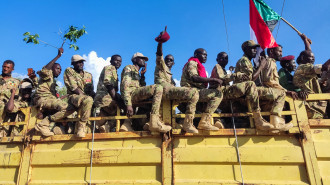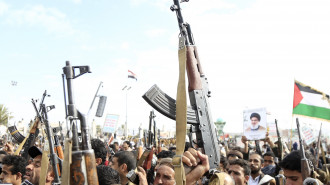Rich countries 'least generous' to Syrians
Despite the catastrophic scale of suffering and the numbers of people fleeing the conflict, rich countries have given barely half the aid money needed to help people in Syria and surrounding countries last year, according to new analysis by leading international charity Oxfam.
"The world is failing the people of Syria. Five years on since the start of the crisis the violence and suffering continues to escalate but the level of funding and support fails to match," said Mark Goldring, Oxfam GB Chief Executive.
Since the conflict began in March 2011, it has claimed more than 260,000 lives and has left 13.5 million people inside Syria in desperate need of humanitarian assistance.
It has also devastated an entire generation of Syrian children and youths, who are deprived of education and traumatised by the horrors they have experienced.
Syria's civil war has forced 4.6 million people to flee to neighbouring countries and beyond, sparking a towering refugee crisis.
Even after the unprecedented wave of public sympathy that Syrians witnessed in 2015, as thousands drowned off Europe's coasts, the leaders of these rich countries have still not responded with appropriate measures.
 |
The world is failing the people of Syria. Five years on since the start of the crisis the violence and suffering continues to escalate but the level of funding and support fails to match - Mark Goldring, Oxfam |
 |
The Oxfam report, published ahead of a donor conference in London on 4 February, calculates how much aid and resettlement places are given by countries according to the size of their economy.
The UK, Germany and the Netherlands continue to give generously while Qatar and Saudi Arabia have decreased their funding significantly, and the US has contributed a smaller percentage of its fair share.
While Australia, France and Russia have increased their direct intervention in the conflict, they failed to fund the international appeals as much as they should.
Russia provided just one percent of its fair share to the appeals linked to the crisis in 2015.
"The British government has more than provided its share of financial aid but it has taken less than a quarter of its fair share of refugees," Goldring continued.
"The offer to resettle 20,000 refugees by 2020 equates to each of our 69 cities receiving only around 60 refugees per year, hardly a massive influx. The government's announcement to accept more child refugees from the region, while welcome, barely begins to address the problem. Britain can and should do more."
Collectively, rich nations have so far offered places to 128,612 Syrians, only 28 percent of the minimum they should based on their fair share.
 |
Russia provided just one percent of its fair share to the appeals linked to the crisis in 2015 |  |
In contrast, Syria's neighbouring countries are home to more than four million refugees.
Oxfam is calling for the resettlement in rich countries of 10 percent of refugees registered in Syria's neighbours by the end of 2016, the equivalent of around 460,000 people.
These are Syrians who are at risk, vulnerable women and children, and people with disabilities or injured during the conflict.
Oxfam is also calling for new ways to help Syrians and countries hosting them in the region, such as job creation and opening up the labour market.
"With no chance of returning home soon refugees are stuck between a rock and a hard place: receiving less aid, and unable to sustain themselves without the right to work or valid residency permits," said Goldring.
"They are being forced into debt to pay rent and buy food, reducing the numbers of daily meals, and removing their children from school to send them to work. Refugees are becoming increasingly desperate."
Oxfam called for Lebanon and Jordan to lift restrictions on legal residency and jobs and ensure access for refugees to education and health, while adding that inside Syria, help is not reaching millions of Syrians because of sieges, bureaucratic hurdles and, most of all, unrelenting violence.





 Follow the Middle East's top stories in English at The New Arab on Google News
Follow the Middle East's top stories in English at The New Arab on Google News


